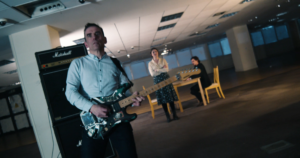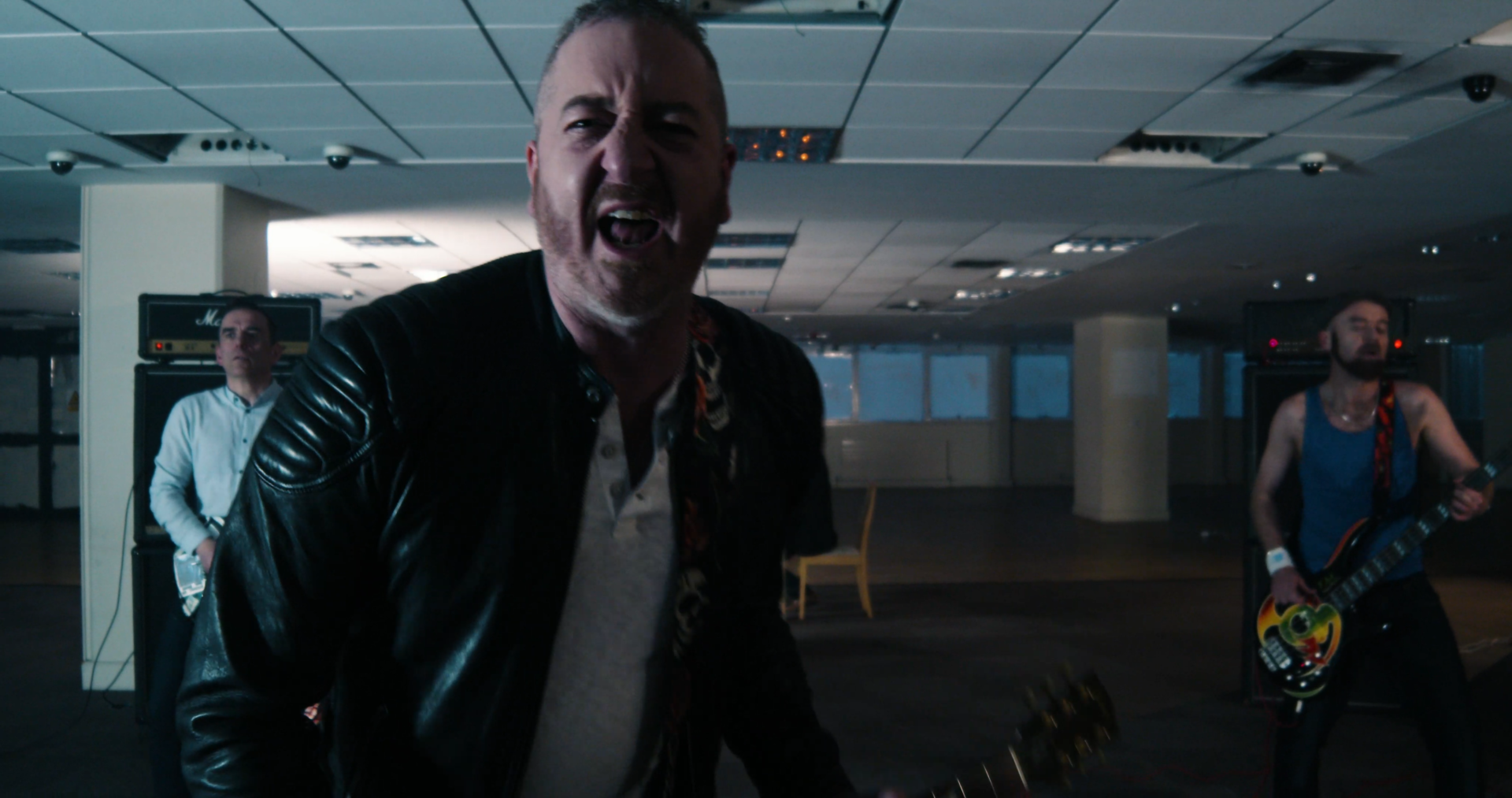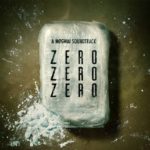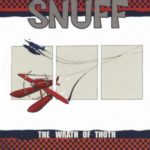
The Edit‘s single ‘Anywhere But Here’ is out now so I decided to have a chat with them about it. I threw in a few of my usual post structualist head scratchers in. Here’s a transcript of how it went down.
Nigel: Vocals/guitar
Steve: Lead guitar
Lewis: Bass Guitar
Matt: Drums
John Clay: Cheers for agreeing to chat to me today guys. How are we all doing in Lock down thus far?
Lewis: Always a pleasure John. It’s been not too different for me really, except for the fact that I’m working even more than I was before!
Nigel: All good thanks John. Strange times but making the best of it as far as possible.
Must be tough being in a band now? What ways are you using to promote the band online?
Matt: We’re reliant on social media – Instagram, Facebook, Twitter and YouTube. Nige has also designed a website which links to all our media (https://theedituk.com)! We’re fortunate that we recorded the album and video prior to lockdown and can release these remotely.
What do you make of acoustic watch parties? Will ‘Anywhere But Here’ translate well in an acoustic multi webcam setup, or would you rather be taking the time to binge Better Call Saul, Tiger King or some other show?
Steve: You never know … first thoughts are that it wouldn’t work out as it’s just not loud enough. But actually we’ve played a few acoustic sets and some of the tracks translated surprisingly well. May be time for Matt to dig the congas out of the wardrobe
How does everyone else feel about this? Does a lack of volume subvert the meaning/message of the art?
Nigel: I don’t necessarily think it alters the meaning, but acoustic versions certainly offer a different tone or feel, and maybe even allow other parts of the lyrics or music to cut through in a clearer way. From a performance point of view, it can be easy to hide behind a wall of distortion, but there’s nowhere to hide acoustically.
There is a belief, particularly in metal where the louder a band is acts as a confirmation of greatness, perhaps even masculinity. How do you feel about this?
Steve: There’s no doubting that some genres place an emphasis on certain traits, whether they be the ‘fastest gun in the West’ approach to ability or loudest in class, as confirmation of greatness, and masculinity as you say, but most of these things are a little like people when they’re on speed; they’ve got a lot to say, but not much of it is worth listening to. There’s no doubting we like the energy and intensity that volume brings, but I think we’ve all been more a fan of those bands who put a little more thought into what they do and how they present it, and hopefully that comes across in the music we play.
The chorus of ‘Anywhere But Here Here’ is pretty whistleble. Did you guys start off with the melody first?
Steve: I think that was one of the songs where the music was completed in its entirety first, and then Nige came in with the melody for the chorus figured out. We always liked the different feels between the verse and chorus; it doesn’t feel to formulaic and has a good balance.
Nigel: Yes, I think that entire song came from a jam around a riff idea. I had an idea for the chorus melody/phrasing with some scratch words before “anywhere but here” stuck and the rest of the words came from that idea.
Cool, and are all the lyrics written by Nigel, or are there songs on the L.P that have been thought up by others? If not, is that door open?
STEVE: There’s no one approach on the songwriting, some of the songs someone will bring in as a sketch or outline of music and someone will add the lyrics and vocal melody. For instance on Free Fall we had the arrangement of the music and then Matt brought the lyrics in, whereas for Dodgy People Lewis brought in finished lyrics and an outline of the structure and we developed the song arrangement as a band around those. Ultimately Nige has got to be happy with the vocal melody so will have final say, but quite a few of the songs have lyric input from the band
Have any media such as books or philosophies significantly altered the way you create your art?
NigeI: can’t think of anything specific, but I do love a “behind the scenes” or “making of” documentary, especially relating to albums/bands, so I would think that has some influence on me personally in terms of how or what I create.
With lockdown it’s fair to presume that people have time to reflect on what truly matters. Have any of you done any soul searching and related it to your music at all?
Nigel: I think the phrase “Anywhere But Here” has taken on some additional meaning over the past few weeks 😂
Naturally. How about the rest of you?
Steve: It’s been interesting, and encouraging to be honest, the role music has played during lockdown with balcony jams and singing thru to virtual gigs; music really does seem to soothe the soul and be playing a part in social bonding, and it’s great to see. I read something the other day about Henry VIII, who chose his organ player to be one of 5 men he was quarantined with when the plague came to England back in the 16th century. Seems we’ve always looked to music to get us through times like these, and it’s something that really does matter to us all.
Interesting fact about Henry VIII there. How about the rest of you? Reached any new conclusions about yourself or and your music?
Matt: I’ve been listening to a lot of music during lockdown and have concluded that my musical tastes are more varied than I first thought! I have also enjoyed listening to entire back catalogues – last Wednesday was Nirvana day. For me, I’ve been struggling to write new music without the rest of the band and a proper drum kit!
‘Stay Away’ and ‘Aneurysm’ are songs that I wished I’d written. How about you,
Lewis? Has lockdown contributed to any musical adventures/revisitations?
Lewis: Well yeah I guess the word revisitations fits quite nicely. I’ve always loved bass tab books, playing through awesome albums whilst sight-reading through the musical score and bass tab combinations. I’ve dug out and played through a few of my faves, including RHCP Californication, Metallica’s Master of Puppets and the Best of Rancid for Bass which are all so much fun and always have been a valuable source of inspiration for myself. If only I could conjure up a riff like Journey To The End Of East Bay by Rancid!
Wow, someone’s been hard at work there! I have one of my post structuralist questions for you guys: given the accessibility of equipment and conduits to express one’s art, does the material itself suffer due to less opportunity to mature, or conversely, can a band learn faster from content being given its day in the sun quicker rather than later?
Nigel: Certainly, the tools and channels available today offer great opportunity, but I think there is a lot to be said for an organic, iterative process where a song (or any other creative project) has the chance to breathe and grow, stumble down creative cul-de-sacs, but also find destinations of surprising creativity that no-one could foresee. As a band, I think we have a great process where everybody has the freedom to contribute, try things, make mistakes (some of which become the key element of the song), and to a degree that can only come over a period of time and reflection, and through experiencing our own creativity through performance and rehearsal, as well as writing and recording. Is any creative endeavour ever truly finished?
Steve: Totally agree. Taking time to allow material to grow and breathe is the way we try and approach the process, and there are songs we play live that have continued to evolve compared to the recorded versions. Admittedly there are classic mainstream songs where the lightning struck and they were written and recorded in the space of an hour or two, so if you are able pull that out of the bag there is definitely room for that, but overall I’m not sure getting material out quickly is necessarily a good thing.
Good points, and yes, nothing ever really is finished in the eyes of many an artist. What would you tell your 16 year old selves about the industry now that you’ve no doubt had a taste for its highs and lows.
Steve: Get out, have fun, play more, rehearse, rehearse, rehearse and don’t take it too seriously
Nigel: Yep, and believe in yourself, you have nothing to lose
Your recent single is brimming with self belief. What were the highs and lows of creating it?
Steve: Never really thought about the self belief aspect…interesting. Is that lyrics or music? Maybe that comes from the four of us all adding our own ingredients into the mix, and all of us pushing the stone up the hill as it were? For me the high was that sections of the song had been around for a while, then the main riff was kicked around separately but nothing came of it, but then those different pieces seemed to slot into place, literally overnight. When that happens and everyone nails that first play thru it’s pretty cool. The low probably came when I forgot to drop the bottom E string to D for the first time we played it live, when we were still working on it, looking at Nige and Lewis thinking, ‘well one of those two is certainly out of tune here’.
Haha! That classic moment. The chorus sounds hopeful, and I detect the self belief angle there.
Nigel: The self belief is about being confident to share what you’ve written without fear, certainly in regards to lyrics, and also in performing – took me a long time to really have the confidence to not only sing but then learn to perform as well. We’ve all had our moments with the dropped D tuning …
I often think that the fear of singing is in part due to the voice being an instrument that’s part of one’s body, and we can be so protective of that. How did you overcome the fear?
Nigel: Sheer bloody-mindedness I think. The younger me was too thin-skinned and sensitive in general; too easily rocked by criticism whether negative or positive, too scared of failure; I think I just reached a point where I felt that that was holding me back, so I decided to adopt a more “why not?” attitude instead of “why?” and just get on with it.
Lewis: For me it’s quite different, when I was younger I was really shy but when a microphone was put in front of me I just forgot all about it and just went for it which I’ve always found pretty strange. I’m a rare breed that can jump on the karaoke stone cold sober! I know I haven’t got a good singing voice so whenever the lads feel I can handle it, I enjoy giving it my best, usually in a rock rap. But during my time with The Edit I feel they’ve helped my voice come on loads which I’m so grateful for.
What do you make of talent show TV/Content’s contribution to people’s fear of making music? Do you think warped aspirations have had a detrimental effect on the industry?
Nigel: Clearly there are, and have been, some talented performers in the talent/reality TV landscape, and each to his own; but I’m not a fan of the entire genre – It seems to exist to serve and leverage the pursuit of Warhol’s 15 minutes of fame rather than nurturing creative talent. As in Vegas, the house always wins, in talent TV, Simon Cowell always wins. Having said that, it’s always been there – Opportunity Knocks started in the 40s/50s – but perhaps it wasn’t as overt as it is now
Careerists motivated by the trappings of fame seldom have much to offer, and I for one am glad that you guys are not aspirational in that way. What do you think of music sync with big brands? Would you allow ‘Anywhere But Here’ to be co-opted with Coke, Nike or McDonald’s?
Steve: That would be a straight no for me. Sometimes it can be done pretty well, but not something that sits well with me.
Besides the marketing guru who decides to use the tag line ‘Anywhere but Here’ to represent the Golden Arches will probably not last too long in the job.
Nigel: Ha, yeah. A cool movie maybe but with you on the big brand sell out.
Ha! So, what are your plans for later this year?
Nigel: Lots of playing live, assuming there’s anywhere still left to play – which is why #saveourvenues is so important, and then album #3 … we went a bit Chinese Democracy between #1 and #2 so would be nice to crack on this time …
Sounds promising! Thanks for your time my friends. I’ve been interviewed for a mag about my work thus far and would like to include you on a playlist they asked me to curate. Is that O.K?
Nigel: Our pleasure John, always good to talk to you. And of course, feel free to include us – happy to share our work and more than happy to support you as well wherever we can. Take care.




